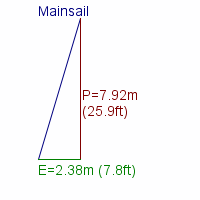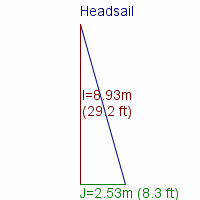Review of Creekmore 20
Basic specs.

If you have a photo you would like to share: Upload Image
Looking for a new boat? Find a Creekmore 20 or similar boat for sale
The hull is made of fibreglass. Generally, a hull made of fibreglass requires only a minimum of maintenance during the sailing season. And outside the sailing season, just bottom cleaning and perhaps anti-fouling painting once a year - a few hours of work, that's all.
The Creekmore 20 is equipped with a masthead rig. The advantage of a masthead rig is its simplicity and the fact that a given sail area - compared with a fractional rig - can be carried lower and thus with less heeling moment.
CentreBoard
The Creekmore 20 is equipped with a centreboard keel. A centreboard keel is a pivoting lifting keel, allowing to sail both coastal and inland waters.
Sailing characteristics
This section covers widely used rules of thumb to describe the sailing characteristics. Please note that even though the calculations are correct, the interpretation of the results might not be valid for extreme boats.
What is Capsize Screening Formula (CSF)?
The capsize screening value for Creekmore 20 is 2.34, indicating that this boat would not be accepted to participate in ocean races.
What is Theoretical Maximum Hull Speed?
The theoretical maximal speed of a displacement boat of this length is 5.7 knots. The term "Theoretical Maximum Hull Speed" is widely used even though a boat can sail faster. The term shall be interpreted as above the theoretical speed a great additional power is necessary for a small gain in speed.
The immersion rate is defined as the weight required to sink the boat a certain level.
The immersion rate for Creekmore 20 is about 91 kg/cm, alternatively 513 lbs/inch.
Meaning: if you load 91 kg cargo on the boat then it will sink 1 cm.
Alternatively, if you load 513 lbs cargo on the boat it will sink 1 inch.
Sailing statistics
This section is statistical comparison with similar boats of the same category. The basis of the following statistical computations is our unique database with more than 26,000 different boat types and 350,000 data points.
What is Motion Comfort Ratio (MCR)?
The Motion Comfort Ratio for Creekmore 20 is 13.7.
What is L/B (Length Beam Ratio)?
The l/b ratio for Creekmore 20 is 2.50.
What is Displacement Length Ratio?
The DL-ratio for Creekmore 20 is 212 which categorizes this boat among 'light crusers & offshore racers'.
What is SA/D (Sail Area Displacement ratio)?
The SA/D for Creekmore 20 with ISO 8666 reference sail is 18.2, with a 135% genua the SA/D is 21.6.
Maintenance
Dimensions of sail for masthead rig.


Are your sails worn out? You might find your next sail here: Sails for Sale
If you need to renew parts of your running rig and is not quite sure of the dimensions, you may find the estimates computed below useful.
| Usage | Length | Diameter | ||
| Mainsail halyard | 21.1 m | (69.2 feet) | 8 mm | (5/16 inch) |
| Jib/genoa halyard | 21.1 m | (69.2 feet) | 8 mm | (5/16 inch) |
| Spinnaker halyard | 21.1 m | (69.2 feet) | 8 mm | (5/16 inch) |
| Jib sheet | 6.2 m | (20.5 feet) | 10 mm | (3/8 inch) |
| Genoa sheet | 6.2 m | (20.5 feet) | 10 mm | (3/8 inch) |
| Mainsheet | 15.6 m | (51.3 feet) | 10 mm | (3/8 inch) |
| Spinnaker sheet | 13.8 m | (45.1 feet) | 10 mm | (3/8 inch) |
| Cunningham | 2.4 m | (7.8 feet) | 8 mm | (5/16 inch) |
| Kickingstrap | 4.8 m | (15.6 feet) | 8 mm | (5/16 inch) |
| Clew-outhaul | 4.8 m | (15.6 feet) | 8 mm | (5/16 inch) |
This section is reserved boat owner's modifications, improvements, etc. Here you might find (or contribute with) inspiration for your boat.
Do you have changes/improvements you would like to share? Upload a photo and describe what you have done.
We are always looking for new photos. If you can contribute with photos for Creekmore 20 it would be a great help.
If you have any comments to the review, improvement suggestions, or the like, feel free to contact us. Criticism helps us to improve.
